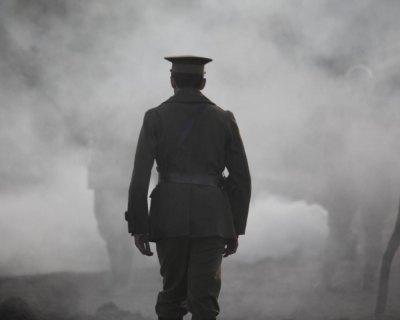Docudramas: Lost in the fog of war

Even so, the History channel celebrates the 70th anniversary of the Normandy invasion with D-Day in HD, a production featuring “rare” footage rendered in high definition. The channel also promises interviews with both Allied and German survivors of the June 6, 1944, battle.
Numerous specials on various networks examine every facet of that bloody day on the beaches, from the challenging cliffs of Normandy to the use of photography in gathering intelligence to the trying period after the initial landing.
But while D-Day documentaries abound, this year also marks the 100th anniversary of the beginning of World War I, and the History channel stands apart in its ambitious attempt to put both wars in perspective with The World Wars.
The three-program, six-hour series premiered on Memorial Day. If you were preoccupied with your barbecue grill and missed it, worry not. You can watch the series on the History channel’s website or buy it on DVD or Blu-Ray.
The World Wars is a docudrama based on the premise that the leaders of World War II were formed by their experience during World War I. Actors portray President Franklin D. Roosevelt, Adolf Hitler, Joseph Stalin, Winston Churchill, Benito Mussolini and American generals George Patton and Douglas MacArthur.
Hitler, Churchill, Mussolini, Patton and MacArthur all saw action during the first war. Roosevelt served as assistant secretary of the Navy. In the production, Joseph Stalin makes an appearance as a youngish-looking revolutionary -- although by 1917, he would have been 39.
Brace yourself for six hours of ominous music, explosions, goose-stepping Germans and straight-on narration by actor Jeremy Renner. It is fast moving for the most part (setting aside the commercials for Mountain Men.)
But when all is said and done, The World Wars is more concerned with drawing character arcs than telling the story of history.
The Narrative
The series begins in the slums of Austria, home to the young Adolf Hitler, an art school reject with no prospects.
As Hitler pawns off his lousy art around Vienna, trouble brews elsewhere in Europe. On June 28, 1914, an assassin shoots Austrian Archduke Franz Ferdinand and his wife during a visit to Sarajevo, Bosnia-Herzegovina. This triggers a chain of events that lead to World War 1.
That’s about all the documentary has to say about it. It offers no insight into the roots of the conflict or the alliance system that swiftly tightened like a noose. Instead, the narrative plunges onward, rejoining the story of young Adolf, who finds his purpose within the German army.
(For those with time, The History channel offers additional videos – including Bet You Didn’t Know: World War 1 -- on its website.)
You were there
Docudramas excel when the viewer feels as though a fly on the wall, and in that sense, The World Wars often delivers. In one sequence, Roosevelt, pushing forward his New Deal projects, squares off with MacArthur over the country’s anemic military. An ocean away, Hitler strides through a German factory producing the aircraft he will need for war.These scripted sequences paint a picture of events – but sometimes leave viewers scratching their heads. At one point, Roosevelt’s aides inform him that if the Japanese attack the Philippines, the best MacArthur can do is to slow them down.
“There is one thing,” an aide intones. “Japan is totally dependent on foreign oil. We stop that, we stop the war machine.”
“Where do they get their oil?” Roosevelt asks.
“From us,” the aide responds.
The script successfully introduces the embargo cutting Japan’s oil supply. But it also leaves the impression that after roughly seven years in the White House, Roosevelt didn’t know how Japan was getting its oil.
It also was odd to watch a six-hour series entitled The World Wars without hearing the name Dwight D. Eisenhower – Supreme Allied Commander and later, 34th president of the United States.
During World War I, Eisenhower “requested an overseas assignment but was ordered to remain stateside as a training instructor” at several military bases, according to “The Complete Book of U.S. Presidents” (Barricade Books Inc.; 1993), by William A. DeGregorio. The central thesis of The World Wars was to explore how World War I shaped the leaders of World War II. Perhaps this explains why Eisenhower didn’t make the cut. Even so, the absence of this key figure is felt. And it again brings the question: Which is more important, character arc or history?
An extended version of The World Wars is scheduled for H2 June 22. D-Day in HD premiered on the anniversary, June 6, at 9 p.m.
Related:
D-Day commemorated with high-tech programs
Video: D-day landing at Imax theaters

